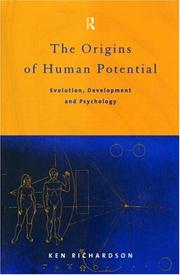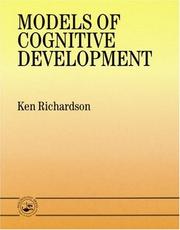| Listing 1 - 10 of 20 | << page >> |
Sort by
|

ISBN: 0415173701 9780415173704 Year: 1998 Publisher: London Routledge
Abstract | Keywords | Export | Availability | Bookmark
 Loading...
Loading...Choose an application
- Reference Manager
- EndNote
- RefWorks (Direct export to RefWorks)
Social psychology --- Intellect --- Nature and nurture --- Intellect. --- Nature and nurture.

ISBN: 0863778526 0863778534 9780863778520 9780863778537 Year: 1998 Publisher: Hove Psychology press
Abstract | Keywords | Export | Availability | Bookmark
 Loading...
Loading...Choose an application
- Reference Manager
- EndNote
- RefWorks (Direct export to RefWorks)
Cognition in children. --- Cognitive psychology --- Developmental psychology --- #PBIB:1999.4 --- Cognition in children --- Cognition (Child psychology) --- Thought and thinking in children --- Child psychology

ISBN: 0863770886 0863770878 Year: 1988 Publisher: Open : Lawrence Erlbaum Associates [LEA],
Abstract | Keywords | Export | Availability | Bookmark
 Loading...
Loading...Choose an application
- Reference Manager
- EndNote
- RefWorks (Direct export to RefWorks)
Ontwikkelingspsychologie --- cognitieve ontwikkeling. --- Cognition in children --- Cognition chez l'enfant

ISBN: 1135470987 1280406429 0203494148 0203219198 9780203219195 9780203494141 9780863778537 0863778534 9780863778520 0863778526 6610406421 9786610406425 9781280406423 9781135470982 1135470979 Year: 1998 Publisher: Hove, East Sussex, UK Psychology Press
Abstract | Keywords | Export | Availability | Bookmark
 Loading...
Loading...Choose an application
- Reference Manager
- EndNote
- RefWorks (Direct export to RefWorks)
In spite of its obvious importance and popularity, the field of cognitive development remains highly fragmented, scientifically. Instead of theoretical convergence towards a generally accepted set of principles, there remains a vast diversity of models of what knowledge and reasoning are, and how they develop. Courses and books tend to deal with this perplexing situation by simply presenting students with either a specific, favoured line, or by offering selections from the theoretical salad. As a result, students have great difficulty in obtaining a cohesive picture of the area. They are frequently bewildered by the diversity of schools, frameworks and approaches, with seemingly little connection between them. More seriously, they are deprived of a critical grasp of the area, and thus forced into a habit of early selectivity, rote memory of specific models in isolation, and regurgitation at exams. This in turn deprives the area of cognitive development of important critical impetus for future improvement. Models of Cognitive Development is an attempt to overcome these problems. It does this by arguing that the vast diversity of theories or models can be organised into groups according to a much smaller set of underlying assumptions or preconceptions, which themselves can be historically interrelated. By understanding these, students may be helped to find their way more confidently around the area as a whole, to see the 'wood' as well as the theoretical forest, and thus find themselves in a position to react to individual models more positively and more critically. Such criticism may, in turn, assist theoretical progress and unity in the future. Models of Cognitive Development covers all the contemporary theoretical and research strands in the area, with numerous examples, in a clear and straightforward manner, and should be useful to all students, researchers, and comparative theoreticians in the area. In spite of its obvious importance and popularity, the field of cognitive development remains highly fragmented, scientifically. Instead of theoretical convergence towards a generally accepted set of principles, there remains a vast diversity of models of what knowledge and reasoning are, and how they develop. Courses and books tend to deal with this perplexing situation by simply presenting students with either a specific, favoured line, or by offering selections from the theoretical salad. As a result, students have great difficulty in obtaining a cohesive picture of the area. They are frequently bewildered by the diversity of schools, frameworks and approaches, with seemingly little connection between them. More seriously, they are deprived of a critical grasp of the area, and thus forced into a habit of early selectivity, rote memory of specific models in isolation, and regurgitation at exams. This in turn deprives the area of cognitive development of important critical impetus for future improvement. Models of Cognitive Development is an attempt to overcome these problems. It does this by arguing that the vast diversity of theories or models can be organised into groups according to a much smaller set of underlying assumptions or preconceptions, which themselves can be historically interrelated. By understanding these, students may be helped to find their way more confidently around the area as a whole, to see the 'wood' as well as the theoretical forest, and thus find themselves in a position to react to individual models more positively and more critically. Such criticism may, in turn, assist theoretical progress and unity in the future. Models of Cognitive Development covers all the contemporary theoretical and research strands in the area, with numerous examples, in a clear and straightforward manner, and should be useful to all students, researchers, and comparative theoreticians in the area.
Cognition in children. --- Child psychology. --- Behavior, Child --- Child behavior --- Child study --- Children --- Pediatric psychology --- Child development --- Developmental psychology --- Cognition (Child psychology) --- Thought and thinking in children --- Child psychology --- Psychology
Book
ISBN: 023154376X 9780231543767 0231178425 9780231178426 Year: 2017 Publisher: New York
Abstract | Keywords | Export | Availability | Bookmark
 Loading...
Loading...Choose an application
- Reference Manager
- EndNote
- RefWorks (Direct export to RefWorks)
For countless generations people have been told that their potential as humans is limited and fundamentally unequal. The social order, they have been assured, is arranged by powers beyond their control. More recently the appeal has been to biology, specifically the genes, brain sciences, the concept of intelligence, and powerful new technologies. Reinforced through the authority of science and a growing belief in bio-determinism, the ordering of the many for the benefit of a few has become more entrenched. Yet scientists are now waking up to the influence of ideology on research and its interpretation. In Genes, Brains, and Human Potential, Ken Richardson illustrates how the ideology of human intelligence has infiltrated genetics, brain sciences, and psychology, flourishing in the vagueness of basic concepts, a shallow nature-versus-nurture debate, and the overhyped claims of reductionists. He shows how ideology, more than pure science, has come to dominate our institutions, especially education, encouraging fatalism about the development of human intelligence among individuals and societies. Genes, Brains, and Human Potential goes much further: building on work being done in molecular biology, epigenetics, dynamical systems, evolution theory, and complexity theory, it maps a fresh understanding of intelligence and the development of human potential. Concluding with an upbeat message for human possibilities, this synthesis of diverse perspectives will engender new conversations among students, researchers, and other interested readers.
Intellect --- Intelligence tests. --- Brain --- Cognition. --- Psychology --- Intelligence levels --- Intelligence testing --- IQ tests --- Mental tests --- Psychological tests --- Genetics --- Genetic aspects. --- Physiology. --- Testing
Book
ISBN: 1108937756 1108837131 1108944868 Year: 2022 Publisher: Cambridge : Cambridge University Press,
Abstract | Keywords | Export | Availability | Bookmark
 Loading...
Loading...Choose an application
- Reference Manager
- EndNote
- RefWorks (Direct export to RefWorks)
Have you ever wondered why psychologists still can't agree on what intelligence is? Or felt dismayed by debates around individual differences? Criticising the pitfalls of IQ testing, this book explains the true nature of intelligent systems, and their evolution from cells to brains to culture and human minds. Understanding Intelligence debunks many of the myths and misunderstandings surrounding intelligence. It takes a new look at the nature of the environment and the development of 'talent' and achievement. This brings fresh and radical implications for promoting intelligence and creativity, and prompts readers to reconsider their own possibilities and aspirations. Providing a broad context to the subject, the author also unmasks the ideological distortions of intelligence in racism and eugenics, and the suppressed expectations across social classes and genders. This book is a must-read for anyone curious about our own intelligence.
Eugenics. --- Intelligence levels. --- Intellect. --- Human intelligence --- Intelligence --- Mind --- Ability --- Psychology --- Thought and thinking --- Intelligence quotient --- IQ (Intelligence quotient) --- Educational psychology --- Homiculture --- Race improvement --- Euthenics --- Heredity --- Involuntary sterilization

ISBN: 0335093973 Year: 1991 Publisher: Philadelphia : Open University Press,
Abstract | Keywords | Export | Availability | Bookmark
 Loading...
Loading...Choose an application
- Reference Manager
- EndNote
- RefWorks (Direct export to RefWorks)
Book
ISBN: 0140806504 Year: 1972 Publisher: Harmondsworth : Penguin books,
Abstract | Keywords | Export | Availability | Bookmark
 Loading...
Loading...Choose an application
- Reference Manager
- EndNote
- RefWorks (Direct export to RefWorks)
Ethnopsychology. --- Intellect. --- Nature and nurture. --- Environment --- Genetics, Human --- Intelligence --- Racial stocks --- Essays. --- Essays. --- Essays. --- Essays.

ISBN: 9780753809983 Year: 2000 Publisher: London : Phoenix,
Abstract | Keywords | Export | Availability | Bookmark
 Loading...
Loading...Choose an application
- Reference Manager
- EndNote
- RefWorks (Direct export to RefWorks)
The many faces of intelligence -- IQ: the misconstruction of intelligence -- Does biology hold the key? Searching biology for intelligence -- Computations and connections -- Intelligent systems -- Constructive intelligence -- Social intelligence -- The intelligent brain.
Book
ISBN: 9781108937757 9781108837132 9781108940368 Year: 2022 Publisher: Cambridge Cambridge University Press
Abstract | Keywords | Export | Availability | Bookmark
 Loading...
Loading...Choose an application
- Reference Manager
- EndNote
- RefWorks (Direct export to RefWorks)
| Listing 1 - 10 of 20 | << page >> |
Sort by
|

 Search
Search Feedback
Feedback About
About Help
Help News
News